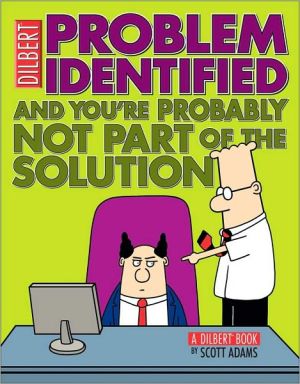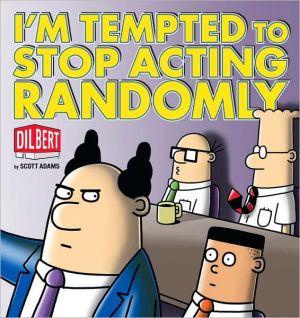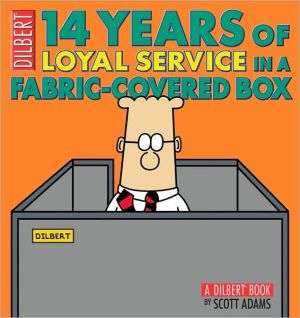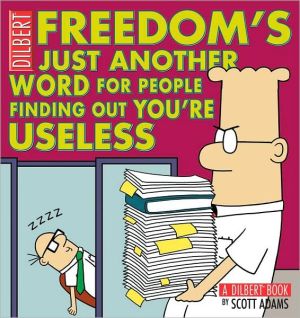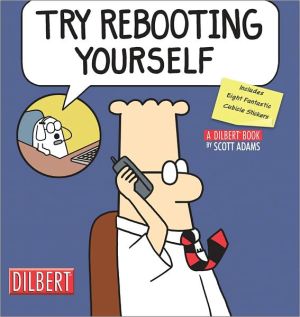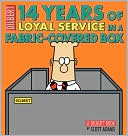Dilbert and the Way of the Weasel
In this hilarious new book, Scott Adams introduces the Weasel Zone — the giant gray area between good moral behavior and outright criminality. It's where your coworkers, bosses, salespeople, CEOs, human resource executives, hotel clerks, home repair people, and loved ones reside.\ In twenty-seven compelling chapters, Scott reveals the secrets of these slippery characters: how to recognize them, how they operate, how to stop them in their tracks — and how you, too, can become a weasel.\ You'll...
Search in google:
In this hilarious new book, Scott Adams introduces the Weasel Zone — the giant gray area between good moral behavior and outright criminality. It's where your coworkers, bosses, salespeople, CEOs, human resource executives, hotel clerks, home repair people, and loved ones reside. In twenty-seven compelling chapters, Scott reveals the secrets of these slippery characters: how to recognize them, how they operate, how to stop them in their tracks — and how you, too, can become a weasel. You'll learn the best practice weasel methods for avoiding work, besting coworkers, and hiding your incompetence. To enhance your personal life, you'll find precise instructions for training your spouse to become your remote-controlled robot, whining like a weasel no matter how good your life is (even if you're a bestselling author!) and using Weaseleze, the official tounge of weasels, to conceal your meaning and confuse your enemies. Read by Scott Adams Publishers Weekly Adams, creator of the Dilbert comic strip and author of The Dilbert Principle and other huge sellers, now shares his sentiments on the office colleague everyone loves to hate: the weasel. This crafty character is the co-worker who stabs colleagues in the back and manages to get ahead without lifting a finger. As one cartoon illustrates, the weasel is the guy who tells poor Dilbert, "I'm Bucky, the project manager. Your assignment is painfully difficult and probably unnecessary. If you need me, I'll be complaining about you to your boss." Being a weasel isn't all bad, though; Adams observes that weasels often have successful careers without ever doing much work. There are several ways to accomplish this, one being, "For every task you plan to do, it's a good idea to have sixty tasks that you've promised to do later if you ever find the time. This gives everyone the impression that you are valiantly battling an avalanche of work and fighting against long odds to make the company successful. Or they might think you're a worthless, inefficient weasel. Either way, the pay is exactly the same and it cuts down on your workload." In short chapters, Adams discusses a variety of weasel behaviors, including leaving incorrect phone numbers to confuse callers, mastering the art of whining, and communicating effectively (which is "to say as much as possible without saying anything"). Sprinkled with Dilbert cartoons throughout, the book will strike a chord among the countless cubicle-dwellers to whom the weasel is all too familiar. 50 cartoons. (Nov.) Forecast: Given Adams's track record, along with a 25-city radio tour, a 15-city NPR campaign, a TV satellite tour and national advertising, this one is likely to take off quickly, especially among those disillusioned or just plain fed up with corporate America. Copyright 2002 Cahners Business Information.
Entertaining Yourself at Work\ Criticizing Coworkers\ If you don't feel like doing any actual work, and yet you want to appear "useful," you can spend your workday criticizing coworkers, i.e., weasel work. It's both easy and entertaining and it shows your dedication to teamwork.\ Luckily for you, your coworkers are no better at their jobs than you are at yours. So there's plenty of material to work with.\ Try to resist the urge to laugh out loud as you enjoy your God-given right of making other people feel like losers. Pick out some obvious problems with a coworker's performance and then suggest the most unpleasant solution imaginable. For example:\ "Gee, Carl, it looks like your customers and vendors aren't on the same page. You should host a conference somewhere in the middle of their locations, like Iraq, to work out all of the differences."\ Later, when your coworker runs into problems with his project, you can remind him that you suggested a solution but it was "ignored." Then shake your head in disgust and shuffle away.\ Taking Training\ If you get a kick out of making your boss nervous, take training classes. Bosses know that when you display an appetite for learning, it means one thing: you're planning to leave for a better job.\ Your pointy-haired boss would prefer that you remain slightly incompetent because incompetence is less expensive than training, a and incompetent employees can't leave for better jobs. And when your boss wants to experience the joy of criticizing subordinates, untrained employees are a target-rich environment.\ That's why you should sign up for training classes at every opportunity, such as when your boss is on vacation. Training is easier than working-especially if you don't pay attention to the instructor-and it makes your boss squirm. That's a win-win scenario. After the training, drop hints of your impending departure like "Those training classes have made me see how wonderful the world is -- out there."\ Attractiveness\ Attractive people have special weasel privileges because the rest of us like to look at them. No one wants to take a chance of angering good-looking people because if they go someplace else, then we'll have to sit around looking at each other. And that's not entertaining.\ Have you ever noticed that attractive people leave early from any gathering? If it's a long meeting, they leave during the first break. If it's a party, they leave halfway through. Sometimes they say they're planning to attend but they don't show up.\ I first noticed this effect when I was in my early twenties. At that age I didn't dare talk during meetings because I didn't know what any of the buzzwords meant. I could sit in a meeting for three hours and leave without even knowing what the topic had been. I compensated for my complete worthlessness by nodding and sometimes pretending to take notes. For me, the only way to survive the boredom was to stare at attractive women in the room and fantasize that they lusted after short, confused men with thick glasses. I imagined that if they only got to know the real me, they would understand that I have no discernible personality either, and it would be a turn-on.
\ From Barnes & NobleThe Barnes & Noble Review\ In this scathingly funny satire of corporate life, Scott Adams, the cartoonist whose deadpan style and ruthless honesty have made him the spokesperson for cubicle dwellers everywhere, calls upon Dilbert, Dogbert, and their colleagues to expose that most pernicious of workplace scourges -- the weasel! What exactly, you may be wondering, is a weasel? Well, a weasel is someone who doesn't know how to do his job but is a master at covering it up. A weasel is also someone who continuously annoys her coworkers but is unfailingly promoted to management-level jobs. In fact, weasels are ubiquitous and all-powerful: If you want to succeed, start asking how you, too, can become one! Throughout the book, Adams uses both cartoons and text to expose the strategies by which weasels have gained power. For example, the weasel manager can "motivate" his or her employees by telling them how much their raises would have been in a better economy. A highlight of the book are real emails from office workers recounting weasel-like behavior at their companies -- like the tale of a "New Attitude" campaign in which a manager fined her employees a dollar each time she caught them not smiling. As a bonus, Adams gives you some very direct techniques for dealing with unwanted coworkers: If you're trapped by a weasely office mate who just won't leave, nothing says "I need some quiet time" like trying to gnaw off your own arm! Thanks to Scott Adams, office workers everywhere can save their sanity with this hilarious book. Amina Sharma\ \ \ \ \ Publishers WeeklyAdams, creator of the Dilbert comic strip and author of The Dilbert Principle and other huge sellers, now shares his sentiments on the office colleague everyone loves to hate: the weasel. This crafty character is the co-worker who stabs colleagues in the back and manages to get ahead without lifting a finger. As one cartoon illustrates, the weasel is the guy who tells poor Dilbert, "I'm Bucky, the project manager. Your assignment is painfully difficult and probably unnecessary. If you need me, I'll be complaining about you to your boss." Being a weasel isn't all bad, though; Adams observes that weasels often have successful careers without ever doing much work. There are several ways to accomplish this, one being, "For every task you plan to do, it's a good idea to have sixty tasks that you've promised to do later if you ever find the time. This gives everyone the impression that you are valiantly battling an avalanche of work and fighting against long odds to make the company successful. Or they might think you're a worthless, inefficient weasel. Either way, the pay is exactly the same and it cuts down on your workload." In short chapters, Adams discusses a variety of weasel behaviors, including leaving incorrect phone numbers to confuse callers, mastering the art of whining, and communicating effectively (which is "to say as much as possible without saying anything"). Sprinkled with Dilbert cartoons throughout, the book will strike a chord among the countless cubicle-dwellers to whom the weasel is all too familiar. 50 cartoons. (Nov.) Forecast: Given Adams's track record, along with a 25-city radio tour, a 15-city NPR campaign, a TV satellite tour and national advertising, this one is likely to take off quickly, especially among those disillusioned or just plain fed up with corporate America. Copyright 2002 Cahners Business Information.\ \

